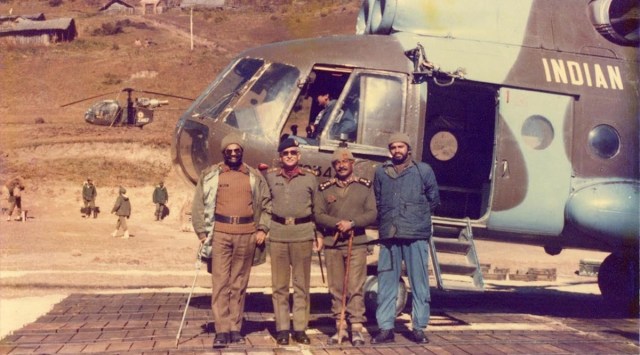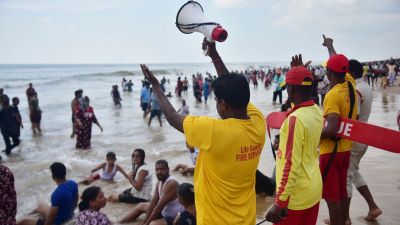When Indian Army troops kissed the ground on re-occupying territory in Arunachal
Major General P K Batra (retd), then Brigade Commander, recalls the Indian Army’s successful Operation Falcon against China in Arunachal Pradesh in 1986.
 Officers involved in Op Falcon including then Brig PK Batra. (Express Photo)
Officers involved in Op Falcon including then Brig PK Batra. (Express Photo) The clash of Indian Army troops with Chinese soldiers in Arunachal Pradesh last month has brought into focus another successful thwarting of Chinese designs by an Indian Army brigade in 1986. Major General P K Batra (retd) was commanding the Mountain Brigade, which was at the forefront in re-capturing a crucial height and recovering remains of Indian soldiers who died in hand-to-hand fighting at the same place in the 1962 war. He spoke to The Indian Express:
Q. Does the recent clash with PLA troops in the Tawang sector rekindle memories of Op Falcon? Is the place of the recent stand-off somewhere close to where the previous one occurred?
Batra: The recent clash at Yangtse does not exactly rekindle memories of ‘Op Falcon’. Yangtse lies 25-30 km northeast of Tawang and lies on our side of Line of Actual Control (LAC) and this post is occupied by our troops. The Chinese claim this post like many others along the LAC as on their side, hence keep creating skirmishes to keep the matter of dispute on LAC alive. However, our boys were ready and thwarted their intentions to occupy this post. The reinforcements in the form of QRTs (quick reaction teams) at brigade level further upset the Chinese plan and after a scuffle, which lasted for a couple of hours, they left, with minor injuries on both sides. The skirmish was at brigade level.
Q: Please give a gist of the operation your brigade undertook in Op Falcon.
Batra: Op Falcon was a stand-off between the PLA and us and lasted for over a year. The Chinese claim Arunachal as theirs but during Op Falcon, their intention seemed to be to claim Thagla, Khinzamane etc. In 1985, they established a post at Samdrong Chu/Wangdung with a view to creep up and occupy Lungrola Pass. Their presence was reported by one of our patrols and Lungrola was occupied by us, thus thwarting their aim. They subsequently built up this post to over a company strength. This place and Hathungla are to the northwest of Tawang. Chinese patrols were sighted on Thagla, coming down to Namka Chu. Hathungla is across Namka Chu.
I was commanding 77 Mountain Brigade, which was deployed to thwart the Chinese intention to creep up further from Wangdung. Slowly but steadily, we surrounded this post from all sides. However, we were not allowed to capture this post. They were like sitting ducks. This and the capture of Hathungla are two major achievements of the Indian Army at that point in time.
 Chinese soldiers after being confronted by Indian soldiers in Arunachal Pradesh in Op Falcon. (Express Photo)
Chinese soldiers after being confronted by Indian soldiers in Arunachal Pradesh in Op Falcon. (Express Photo)
Q: What was the level of operational preparedness in your brigade when you were asked to re-occupy Hathungla? Did the move come as a surprise to you?
Batra: We were eyeball-to-eyeball at Wangdung. The Chinese did try to move up and we opened fire and they ran back. One had to be alert 24×7 and one could not let the guard down. In our discussions, we felt the Chinese will try and occupy Hathungla and therefore we may have to pre-empt that from happening. So we started preparing for this operation. My boys were excited when we got the green signal.
Q: What was your assessment of the intentions of the PLA forces and how far they were willing to extend the face-off at that time?
Batra: My assessment was they were in a tight spot at Lungrola. On a few occasions, we saw choppers carrying dead bodies from Wangdung. They could not pull out as it would be tantamount to accepting defeat. They could try and occupy some other area and negotiate. My personal feeling is their morale was low. They were looking for an honourable exit.
Q: What kind of logistics problems did you face at the time to deal with the situation?
Batra: The road to Lumla (road head) was a series of potholes connected with each other. From there to Lumpo, my Brigade HQ, and to Lungrola, a distance of over 15 km, only a mule track was available. My brigade was maintained by mules and Air Force – a force that never fails you. The Indian Air Force did a wonderful job. The weather was foul, yet they managed air drops, sometimes the parachutes would drift due to strong winds, luckily the locals would retrieve them for us. Our IAF choppers would manage to sneak through foul weather at Lumpo. Every few minutes, a chopper will land. Whilst one is being unloaded, one is hovering above to land. My boys named Lumpo as ‘Lumpo International Helipad’. I was very lucky as both my GOC, Maj Gen J M Singh, from The Brigade of The Guards and my Corps Commander, Lt Gen Narhari, from the Corps of Engineers were hardcore professional soldiers who ensured my brigade should have no problems. We had no control over weather, it could be snowing or raining for days together. We had very anxious moments when my DQ would tell me, “We are very low on…”
Q: You have mentioned coming across remains of Indian soldiers killed in the 1962 war and their honourable cremation. Why were they left there for so many years? And which unit were they from?
Batra: Yes, we did recover some from the bunkers/sangars. Hats off to these brave hearts! We recovered Chinese badges of rank and small brass stars etc. The Chinese came like locusts in swarms and overwhelmed our boys who came out of bunkers/sangars and indulged in hand-to-hand fight that is why Chinese badges of rank etc were found lying there. After ‘62, I call it a year of deceit, no troops went there as the situation was tense and there was no communication with Chinese, nor did they follow the Geneva Convention. According to the Geneva Convention, the Chinese should have returned the bodies of our soldiers to us. The remains must have been eaten by termites or white ants. Unless one sees (it), it is difficult to describe the scene…As someone said, ‘A look is better than a thousand words’. I personally very strongly feel that to respect and honour our brave soldiers we should not blame anyone. I spoke to a few locals who stopped going there. It was their belief that the spirits of those dead were hovering around there. The boys who laid down their lives were from Rajput, Gorkha, Punjab and Grenadier Regiments.
Q: As you look back, what is the most remarkable thing that comes to your mind about Op Falcon?
Batra: When we re-occupied Hathungla, the boys with me knelt and kissed the ground. The Indian soldier is remarkably brave, obedient, highly motivated, disciplined and patriotic. I have love and respect for the ‘62 brave hearts.







